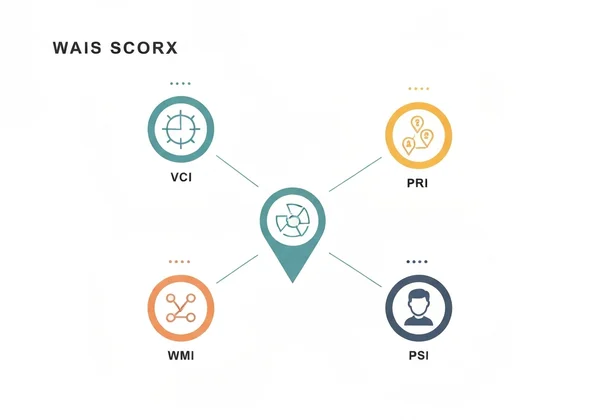WAIS Test Report Analysis: 3 Ways to Unlock Deeper Insights
October 11, 2025 | By Theodore Finch
You have the report in your hands. A collection of scores, percentiles, and technical terms from your Wechsler Adult Intelligence Scale (WAIS) assessment. It’s an incredibly detailed snapshot of your cognitive abilities, but it can also feel overwhelming. You might be wondering, what do all these numbers truly mean for you? The journey from raw data to meaningful self-discovery is the most crucial part of the process, and it’s where true wais report analysis begins.
Understanding your WAIS results is not just about knowing your Full-Scale IQ (FSIQ). It’s about uncovering the unique patterns of your cognitive strengths and challenges, and learning how to leverage that knowledge for personal and professional growth. Whether you're a lifelong learner seeking self-improvement or a professional aiming to optimize your skills, there are several paths to unlock the rich story hidden within your scores. This guide will explore three powerful methods for gaining deeper wais insights.

Understanding Your WAIS Results: The Power of Self-Study
The first step toward empowerment is education. Before diving into advanced interpretations, building a foundational knowledge of your report is essential. This self-guided approach allows you to familiarize yourself with the core concepts at your own pace, turning a complex document into a coherent map of your cognitive landscape.
Decoding Your FSIQ and Index Scores: What the Numbers Mean
Your WAIS report is structured around a few key scores. The most well-known is the FSIQ, which provides a general measure of your overall intellectual ability. However, the real insights lie in the four Index Scores, each representing a distinct cognitive domain:
- Verbal Comprehension Index (VCI): This reflects your ability to access and use verbal information. It involves vocabulary, abstract verbal reasoning, and your store of general knowledge.
- Perceptual Reasoning Index (PRI) / Visual Spatial Index (VSI): This measures your ability to analyze and solve non-verbal problems. It includes tasks like block design, visual puzzles, and understanding spatial relationships.
- Working Memory Index (WMI): This assesses your capacity to hold and manipulate information in your mind for short periods. It's crucial for tasks like mental arithmetic and following multi-step instructions.
- Processing Speed Index (PSI): This evaluates how quickly and accurately you can scan, identify, and respond to visual information. It’s a measure of your cognitive efficiency.
By understanding what each index measures, you can start to see your unique cognitive profile. Are your verbal skills significantly stronger than your processing speed? Does your working memory stand out? These patterns are the first clues to your personal cognitive style. For a complete breakdown, you can explore our expert guides on the subject.

Utilizing Online Resources for WAIS Insights and Context
With your foundational knowledge in place, you can leverage high-quality online resources to add context to your scores. Authoritative platforms dedicated to psychometrics, like this one, offer comprehensive articles and guides that explain subtest details, scoring nuances, and what different score patterns might suggest. This self-study phase helps you formulate specific questions and identify areas you want to explore more deeply, setting the stage for more advanced analysis.
Professional WAIS Report Analysis: When to Consult an Expert
While self-study is a powerful starting point, the expertise of a qualified professional is invaluable for a comprehensive interpretation. A clinical psychologist or neuropsychologist can provide a level of analysis that goes far beyond the numbers, integrating your results with your personal history, goals, and experiences.
The Value of a Clinical Psychologist's Interpretation
A psychologist doesn't just read the scores; they interpret them within the context of you. They are trained to identify subtle patterns and discrepancies between scores that might indicate specific cognitive strengths or underlying challenges. For example, they can explore why a high Verbal Comprehension score might coexist with a lower Working Memory score and discuss what that means for you in real-world scenarios, such as in academic or professional settings. Their interpretation is a clinical, holistic process that a static report can never fully capture.

What to Expect from a Professional WAIS Interpretation Session
During a feedback session, a psychologist will typically:
- Explain your FSIQ and Index Scores in clear, understandable language.
- Discuss significant strengths and weaknesses revealed by the subtest scores.
- Answer your specific questions and relate the findings to your daily life.
- Provide personalized recommendations for educational strategies, career development, or further evaluation if necessary.
This collaborative dialogue provides a layer of personalization and clinical judgment that is considered the gold standard for understanding a formal cognitive assessment.
Advanced WAIS Insights: AI-Powered Personalized Analysis
What if you could combine the depth of data analysis with the personalization of an expert consultation? The third, and most innovative, way to analyze your WAIS report is through advanced AI technology. This approach offers a unique bridge between self-study and professional feedback, transforming your score data into a dynamic, actionable plan.
Beyond Your WAIS IQ Scores: Tailored Cognitive Profiles
Standard reports provide your wais iq scores, but an AI-driven analysis goes a step further. By processing your unique combination of subtest scores, our platform can generate a deeply personalized cognitive profile. It moves beyond broad labels like "above average" and identifies the specific interplay between your abilities. The AI can detect subtle but significant patterns across all subtests that might not be immediately obvious, giving you a much more nuanced view of your cognitive architecture. To see how it works, you can get AI analysis on our platform.
How AI Transforms Your WAIS Data into Actionable Advice
The true power of AI analysis lies in its ability to translate complex data into practical, actionable advice. Instead of just telling you what your scores are, it tells you what you can do with that information. For example, the analysis might suggest:
-
Career Paths that align with your strongest cognitive functions.
-
Learning Strategies tailored to your working memory and processing speed.
-
Communication Techniques that leverage your verbal comprehension skills.
-
Problem-Solving Approaches that play to your perceptual reasoning strengths.

This makes your WAIS report not just an assessment, but a user manual for your own mind.
What Our AI Analysis Offers That Standard Reports Don't
Our AI-powered service provides a unique layer of insight that complements traditional methods. It excels at identifying statistical patterns and relationships within your scores that are difficult to spot manually. This personalized report offers a detailed narrative that explains not just your scores, but the potential real-world implications, helping you connect the dots between your cognitive abilities and your life goals. It’s an accessible, data-driven tool designed to give you the clarity you need to move forward.
Empowering Your Journey: Choosing Your Next Step for WAIS Insights
You've completed the WAIS test, and now the journey of self-discovery truly begins. Whether you choose to start with self-study, consult a professional, or leverage the power of AI, the goal is the same: to transform your WAIS report from a set of numbers into a source of empowerment. Each method offers unique value, and the best path forward may even be a combination of all three.
Your cognitive profile is a powerful asset. Understanding it is the key to unlocking your full potential. If you're ready to take the next step and gain unparalleled insights from your scores, we invite you to start your analysis today.
Frequently Asked Questions About WAIS Report Interpretation
What does a 'good' score on the WAIS test really mean?
A 'good' score is entirely relative to your personal goals and context. The WAIS measures a range of cognitive abilities, and strengths in one area can be just as valuable as strengths in another. Rather than focusing on a single number, a meaningful analysis looks at your entire profile to identify your unique cognitive talents and how they can be applied effectively in your life.
Can AI analysis replace a psychologist's interpretation of my WAIS report?
No. Our AI analysis is a powerful, educational tool designed to provide personalized insights and actionable advice. However, it is not a substitute for a clinical diagnosis or the professional judgment of a qualified psychologist. We recommend using it as a supplementary resource to deepen your understanding alongside, or in preparation for, a professional consultation.
What types of insights can I gain from advanced WAIS analysis?
Advanced analysis, whether from an expert or our AI tool, can help you understand your optimal learning style, identify career fields where you might naturally excel, develop strategies to navigate cognitive challenges, and improve your overall problem-solving skills. It helps you move from knowing your scores to knowing yourself. You can discover your insights with our tools.
Is it possible to interpret my WAIS results by myself?
Yes, it is possible to gain a basic understanding of your results through self-study using reliable sources. Understanding the FSIQ and the four main Index Scores is an excellent starting point. However, for a deep and nuanced interpretation that considers the complex interactions between subtests, a more advanced analysis method is highly recommended.